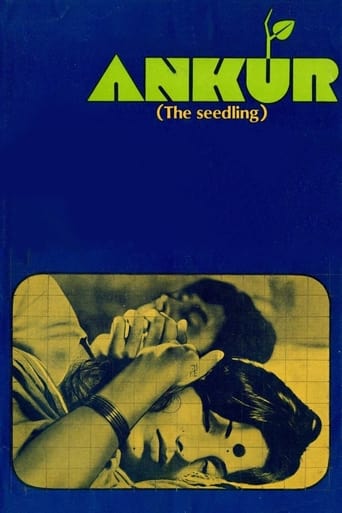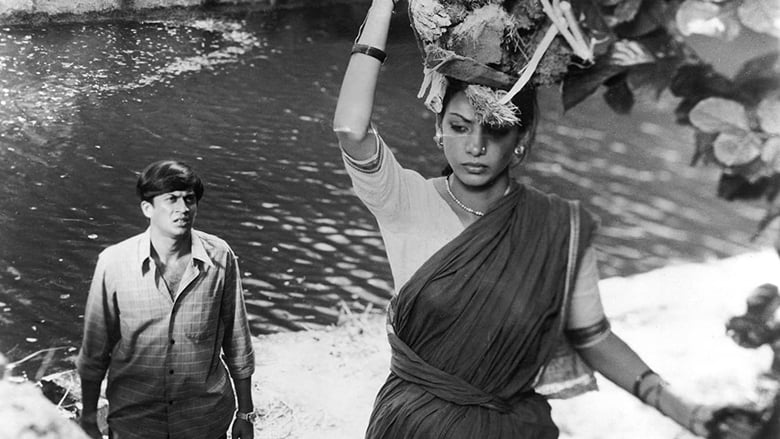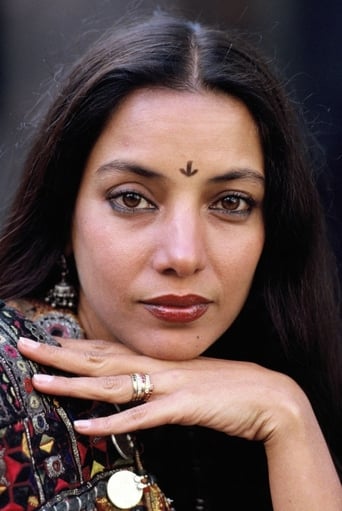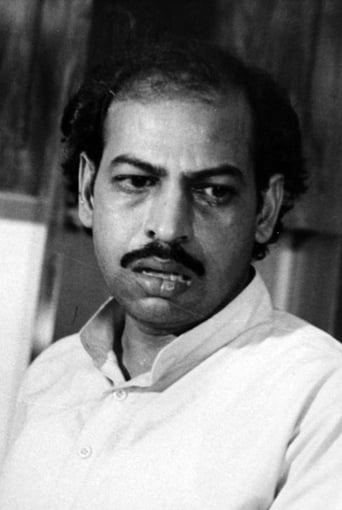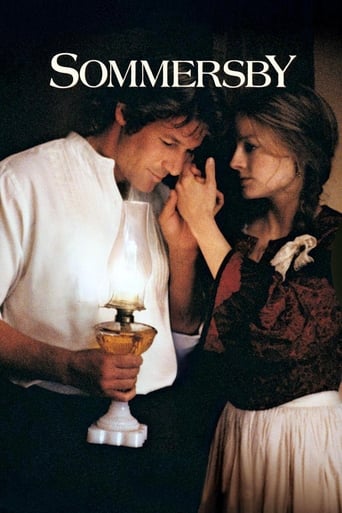Ankur (1974)
Laxmi lives a poor lifestyle in a small village in India along with her husband, Kishtaya, who is a deaf-mute. Both husband and wife work for the wealthy landlord. The landlord's son, Surya, has to cancel his studies and return home to look after the estate, as well as formalize his marriage to Saroj, the girl he was compelled to get married to when he was very young. Shortly thereafter Kishtaya is apprehended stealing toddy from the fields, is severely beaten, left senseless, and when he recovers he absconds, leaving Laxmi alone to fend for herself.
Watch Trailer
Free Trial Channels
Cast


Similar titles
Reviews
the leading man is my tpye
Fresh and Exciting
If the ambition is to provide two hours of instantly forgettable, popcorn-munching escapism, it succeeds.
Blending excellent reporting and strong storytelling, this is a disturbing film truly stranger than fiction
The film, based on a short story by the director himself, was shot in a village somewhere near Hyderabad in Andhra Pradesh. The protagonist speaks in a 'Dakhini dialect' close to Hindi, which in the words of Shyam Benegal, was chosen to have a wider appeal across the country. The tale of exploitation of the poorer section of society by the rich landlords is seen through the predicament of Lakshmi (Shabana Azmi), a maid who falls into a trap of an illegitimate relationship with the young landlord (Anant Nag) when her husband (Sadhu Meher) forsakes her for a while and goes off elsewhere to escape the humiliation he was meted out by Anant Nag for an innocuous act of petty stealing. The scene where Meher is shaved off his hair and paraded on a donkey across the village is a depiction of rural India much as it exists in reality. Shabana Azmi excels in the dramatic sequences towards the climax. The cinematography by Gobind Nihalani is excellent, and sequences such as rain pouring on a tin roof in village houses exude charm of the rural backdrop.Rating: 3.8 out of 5
Surya (Anant Nag) reluctantly becomes the landlord of his father's fields, after his requests to continue further studies are rejected by his father. Surya's father wants him to be financially sound and socially secure, and so gets him married to a young Saroj. Saroj, still a kid, stays back at her house till she comes of age.Meanwhile, Surya stays in the village, where he acquaints Laxmi, the domestic help and her deaf-mute husband Kishtaya, who had been a potter once but was unemployed now. Surya sets things straight in the fields by cutting off the water supplies to his step-mother and step-brother and also ordering the local caretaker to find out who is behind the theft of the juice from the trees. Kishtaya, who is provided the job of taking the village kids to school, turns out to be the culprit and is publicly flayed. He leaves the village without informing anyone, and his wife, Laxmi is left alone with Surya. Surya, being sexually frustrated, makes advances to her and she at last succumbs. Things turn out for the worse when she gets pregnant with his baby and Surya's wife comes to the village to stay with him.Shabana Azmi is a fine and consistent actress and here too she brings temperance to her performance. The scene of compunction is performed with great sincerity and humanness. The same scene could've been ruined with pretentious overacting but under Shyam Benegal's guidance, everything at least looks real. The supporting cast also put truthfulness in their performances, something that I prefer. Usually, I do not like sappiness and I find it a lot in Indian films.The background is verdant and glowing; my favorite color green is frequently seen in the form of grass and trees. Shyam Benegal's direction is cogent, and there are many scenes which touch upon a number of issues prevalent in those times and even now, especially the disturbing attitude of villagers towards caste and the position of women.The movie lacks in completeness, however. One can see a feministic approach Benegal has given here, since Shabana takes up quite a lot of screen time and is also given a mind of her own. But I felt that unfair justice was given to the story in its entirety, mainly because of the excessive focus on Priya Tendulkar's character rather than Shabana's towards the end. It would've been better to keep the direct focus on Anant Nag and Azmi and their characters' behavior towards each other with the coming of Priya's character, who should've got indirect focus. Also, the film does not consider Surya's father's character at the end and ends abruptly with all the blame being put at Surya. I, as a viewer, wanted an ending that was satisfactory for all the characters, as I felt Surya here was not a villain, but just a coward. An example of a perfect climax and catharsis would be 'The Passage to India', which is longer yet more satisfying.Ankur to me is a good film, better than most Indian films today, but not at par with my other Hindi favorites, Pyaasa and Kora Kaagaz ( the Jaya Bachchan movie).My Rating: 6.5/10
Ankur is literally one the best Indian movies I have ever seen actually, it ranks as one of my most favorite films of all time. There is something to be said about the Indian Film Industry while it has altogether crumbled and become wildly glamorous and crass, many of the Indian movies since the advent of cinema and up until the early eighties were stupendous, thought provoking, and wholly a testament to the power of film.Ankur takes place in rural Andhra Pradesh, where a young man fights his father's wishes to run the family farm. He loses the battle, as all good boys would, gets married, and takes up agrarian life. His switch to that lifestyle is jarring, and he becomes rapidly bitter and enraged essentially greed takes a hold of him, and he is unable to control himself in many respects. The story continues, largely focused on his housekeeper, Lakshmi (Azmi), and his relationship with her and the surrounding townspeople. His seemingly consistent life of exerting semi-torture and quasi-love for those he encounters is turned upside down when his wife finally arrives.The character of Lakshmi an young, largely oppressed by still happy worker is not at all unlike the realities of life in India (especially at that time). Benegal uses her exceptional beauty as a sort of scaffold for the viewer not only are we sympathetic to her social predicament, but we are because of who she is, her kind words and fidelity.The most powerful aspect of the film is the director's play on family dynamic, caste, and power. These themes are so interwoven and densely packed into the film, that it is hard to imagine it all coalescing so beautifully in just under two hours. Benegal's films, sometimes noted in the Indian 'New Wave' movement, are generally as such. There is no doubt that this movie has many aspects that are far ahead of its own time and far too advanced for the people who watched it when it was released.Benegal's ability to deal with such vital themes makes the movie all the more amazing. Of course, from a simple entertainment standpoint, the movie is rife with short humor and phenomenal close up shots. In fact, there are many off screen elements to the movie that throw hints at the viewer about what is happening; Benegal almost emulates the great Thomas Hardy, except in film.RATING: 10/10
Ankur is to my mind one of the very best Hindi films ever made. Unusually for Hindi cinema, it is an entirely realistic film without singing and dancing. Since music is of huge commercial importance to Indian cinema, the pressure on directors to include it tends to be impossible to resist and is a constant problem facing 'serious' Indian film-makers. The late seventies was a very special moment with a concerted attempt by some directors ('New Cinema") to buck the commercial trend, of whom the most important were Shyam Benegal and Govind Nihalani (who is responsible for the cinematography in Ankur). Ankur was the first and most strikingly successful films of the "New India" movement (which only lasted some five or six years), Nihalani's Aakrosh (1980) being amongst the last. Working with a young cast (who formed a virtual repertory company for the "New Cinema" films and a committed team, Benegal was able to produce one of the freshest and most compelling of films. Without being in the least pretentious or even belonging to that nebulous category 'the art film', Ankur is a realistic drama without concession that managed also to be a significant commercial success. The acting is superb. Shabana Azmi has had a long and glorious career but has, in my view, never been better than in this, her first important role. Anant Nag (an actor who has never entirely received his due) is also as good here as I have ever seen him. Sadhu Meher (as the deaf and dumb husband) very deservedly won a national award for his performance and Priya Tedulkar is chilling as the narrow-minded malicious young wife. Nihalani's camera-work is also exceptional. In all it is one of those rare occasions when brilliant teamwork around a clearly thought-out project results in a near-perfect film.For the anecdote: There is a nice moment towards the end of the film where Surya (Anant Nag) is playing records and his wife requests something by Nimmi. Before playing the record, he corrects her by pointing out that the record is in fact by Lata. This is a very typical Benegal touch. Not only does it fix the date of the events (c. 1950) but is at once a comment on Hindi cinema history and on the character of the young wife. 1949 was the key year in establishing the absolute domination of 'playback' singers, notably Lata Mangeshkar whose annus mirabilis this was with massive hit-scores in three films, Barsaat, Mahal and Andaaz. In those days, playback singers were often uncredited and many (like the wife in the film) believed the songs to be sung by the actors and actresses themselves. The reference is particularly sardonic in a film that is itself songless. Nimmi made her début as an actress in Barsaat where she plays a simple mountain girl seduced by a cynical young man from the city and this became her typical role in subsequent films. The wife's preference for Nimmi is therefore a comment on the hypocrisy of her harsh attitude towards Lakshmi in the film.

